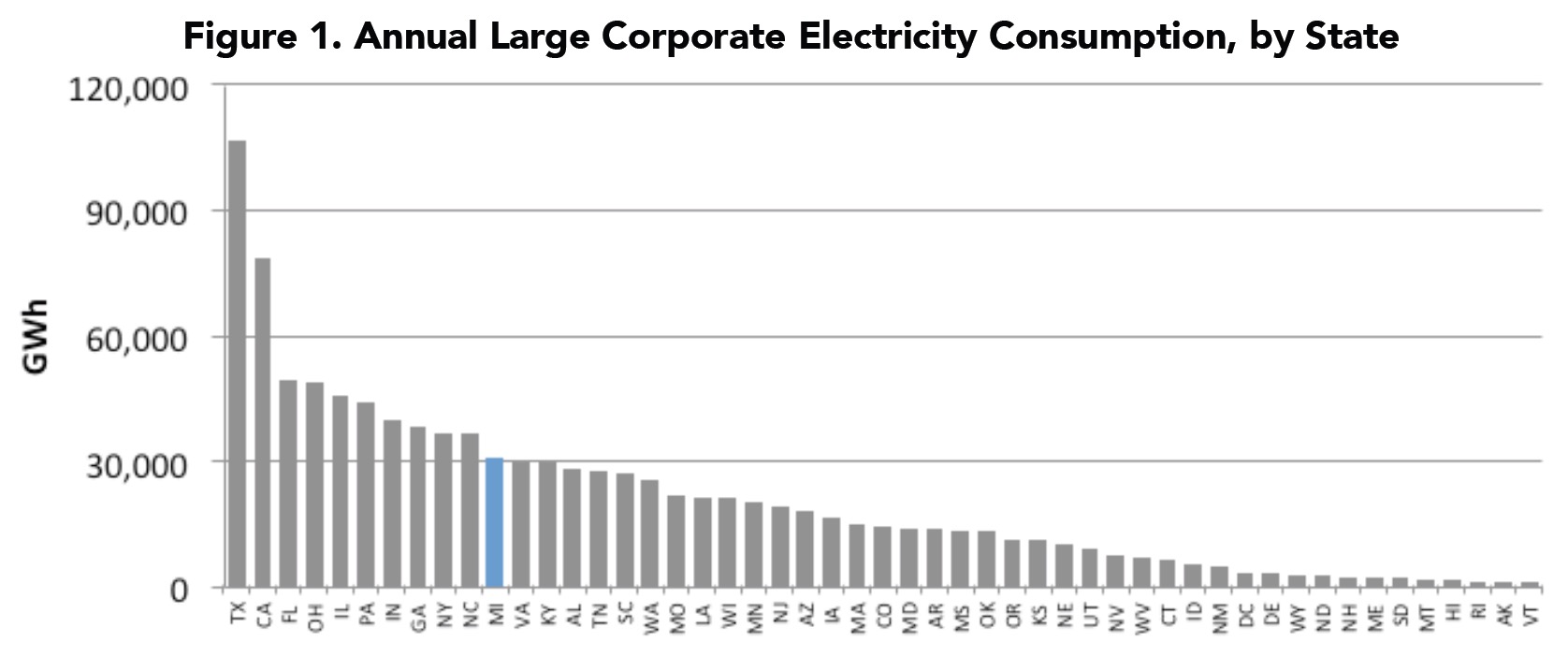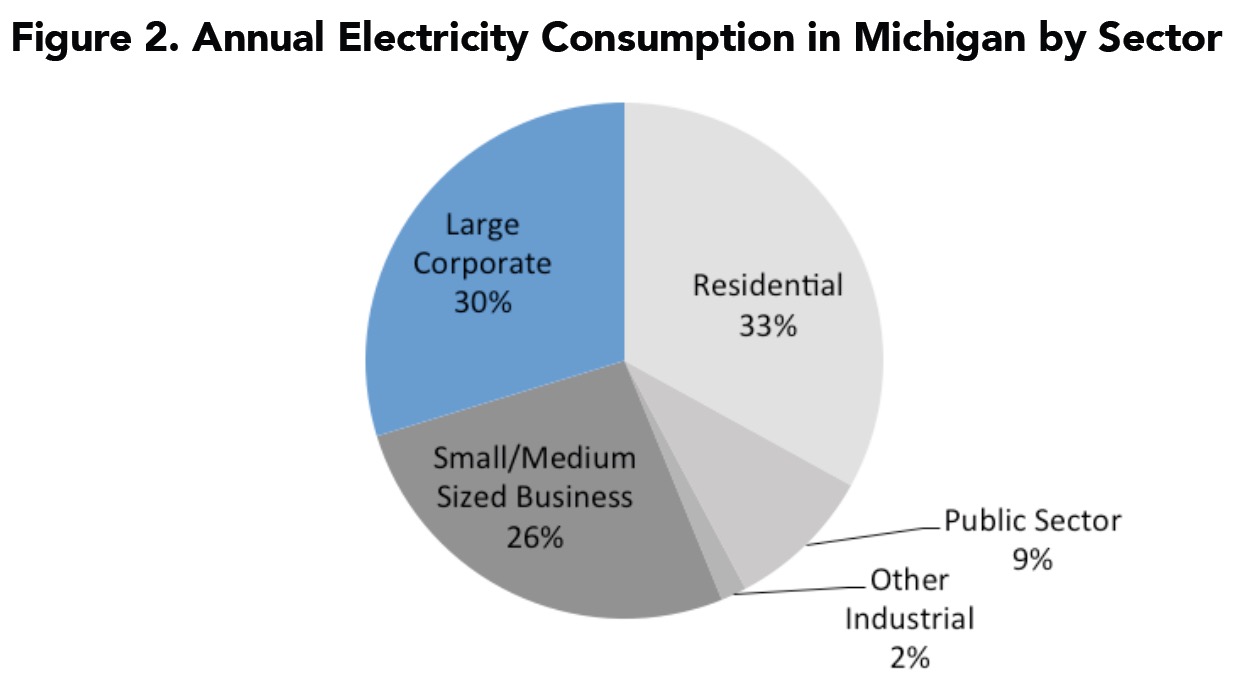ADVANCED ENERGY ECONOMY (AEE)
Overview
A growing majority of the world’s largest corporations have set sustainability targets that involve increased utilization of renewable energy. These companies have realized that renewable energy investments have a positive impact on the bottom line because they offer a fixed-priced, long-term power supply that protects against rising electricity costs. Meeting these corporations’ sustainability targets will require thousands of additional megawatts (MW) of renewable energy, and represents a tremendous market opportunity.
A number of renewable energy projects are already operational across Michigan, and increased demand from corporate buyers will drive additional investment and job creation. However, policy barriers that prevent willing buyers from acquiring renewable resources are stifling market growth and limiting options for companies seeking opportunities to meet corporate financial and sustainability objectives.
This brief discusses ways to expand opportunities for corporations to obtain additional renewable energy resources in Michigan, and examines how the elimination of market barriers can help the state continue to attract and retain companies with sustainability targets.
Michigan’s Largest Corporate Citizens Want Renewable Energy
Leading corporations nationwide have demonstrated their desire to purchase renewable energy. As of 2014, 43% of Fortune 500 companies and 60% of Fortune 100 companies have set climate and/or clean energy targets,1 and as of December 2015, 49 major corporations, representing a market cap of $15 trillion, have signed on to the Corporate Renewable Energy Buyers’ Principles (see appendix).
The priorities identified by these businesses include more choice in renewable energy procurement, access to longer-term fixed-price energy, access to third-party ownership and financing, and the ability to work with utilities and regulators to expand purchasing choices. Companies that have expressed an interest in using renewable energy and have a presence in Michigan include Google, Switch, Nestle, Ikea, and many others. In addition, many of the largest firms headquartered in Michigan – including General Motors, the Ford Motor Company, the Dow Chemical Company, and Whirlpool – are actively seeking additional renewable energy sources to power their operations.
Many of these corporations are leading by example with their investments in advanced energy technologies. Expanded market participation by the state’s business community will translate into significant demand for thousands of additional megawatts of renewable energy.
Some of Michigan’s largest corporations, including Herman Miller, Amway, and Dow Chemical, have used Michigan’s limited Retail Open Access provisions as a means of purchasing renewable energy from independent power producers. However, most Electric Choice programs in Michigan—including those operated by DTE and Consumers Energy, which together serve over 80% of Michigan electricity customers —have reached their limits and are closed to new participation.
Other Michigan corporations have opted to build their own sources of renewable power. GM has developed eleven solar projects totaling over 2 MW at its facilities across the state, and IKEA has built the state’s largest solar array—a 977 kW project—at its Canton store. Some Michigan companies have sought to develop larger projects by selling the power produced from on-site generation to the local utilities, as GM has done with the 800 kW solar project at its Warren facility.
Michigan companies may also have the opportunity to procure renewable resources through agreements with their utility provider. The data company Switch, for example, which recently announced plans to develop the largest data center east of the Mississippi outside of Grand Rapids, Michigan, will work with Consumers Energy to allow the SuperNAP data center to run entirely on renewable energy.
Finally, a number of Michigan-headquartered companies have actively sought out opportunities to power their operations outside of the state with renewable energy. Just last year, GM announced it was directly procuring wind energy to power a number of manufacturing facilities in Mexico through a long-term power purchase agreement, while Dow announced a similar agreement last year for its facility in Freeport, Texas.
Michigan’s Renewable Energy Standard
In 2008, Michigan implemented a Renewable Energy Standard (RES) that required the state’s utilities to source 10% of their power from qualified renewable sources by 2015. The state’s utilities have met this target and are not required to increase their renewable energy resources.
Currently, the state legislature is considering implementing a voluntary goal that 30% of energy come from a combination of energy efficiency and renewable energy by 2025. However, this goal would not place any binding requirements on utilities to develop or purchase new renewable energy resources.
Michigan’s Market Opportunity
Large-scale commercial and industrial (C&I) customers consume a considerable amount of energy in Michigan, which ranks 11th nationwide in terms of annual electric consumption by large corporate customers.
Michigan corporations with more than 500 employees account for roughly 30,000 gigawatt-hours (GWh) of annual electricity consumption, more than a quarter of the state’s total electricity demand.
A growing share of this consumption is being met with renewable energy resources. Driven primarily by the state’s RES, Michigan has developed a substantial wind energy industry. Nearly 900 turbines across the state provide more than 1,500 MW in generating capacity, enough for Michigan to rank 15th nationwide in installed wind energy capacity. If just five percent of Michigan’s large corporate consumers chose to meet their electricity needs by purchasing directly from Michigan wind energy producers, it would spur the development of over 500 MW of new wind energy.
Michigan has yet to meet its solar potential. The state solar industry grew 33% in 2014, but new commercial installations amounted to less than a megawatt, constrained by rules that complicate the development of solar projects larger than 150 kW. Of the 30,000 GWh of electricity used by large Michigan corporations each year, an estimated 12,600 GWh is used at sites that are likely to have the potential for on-site solar generation. This equates to approximately 8,300 MW of solar capacity just to meet the potential for onsite generation for large corporations in Michigan. Meeting just one percent of this demand would result in the addition of more than 80 MW in on-site solar projects – more than 88 times the total for 2014 business installations.
Developing these renewable energy resources would lead to substantial economic development benefits for Michigan. Building 500 MW of new wind energy resources would create an estimated employment impact of 3,000 job-years in Michigan, and spur $370 million in economic development. Installing 80 MW of new solar resources would create an estimated employment impact of 1,800 job-years in Michigan, and spur $234 million in economic development.
Download full version (PDF): Michigan Market Brief – Corporate Renewable Energy Purchasing
About Advanced Energy Economy (AEE)
www.aee.net
Advanced Energy Economy (AEE) is a national association of business leaders who are making the global energy system more secure, clean, and affordable. Advanced energy encompasses a broad range of products and services that constitute the best available technologies for meeting energy needs today and tomorrow. Among these are energy efficiency, demand response, natural gas electric generation, solar, wind, hydro, nuclear, electric vehicles, biofuels and smart grid. It’s all the innovations that make the energy we use more secure, clean, and affordable.
Tags: Advanced Energy Economy, AEE, MI, Michigan, Renewable Energy, Renewables








 RSS Feed
RSS Feed